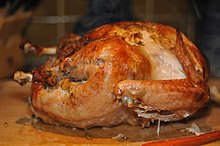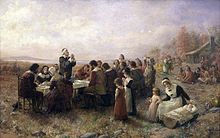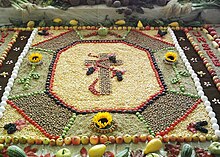Thanksgiving Day is a national holiday celebrated primarily in the United States and Canada as a day of giving thanks for the blessing of the harvest and of the preceding year. Several other places around the world observe similar celebrations. It is celebrated on the fourth Thursday of November in the United States and on the second Monday of October in Canada. Thanksgiving has its historical roots in religious and cultural traditions, and has long been celebrated in a secular manner as well.
History
Prayers of thanks and special thanksgiving ceremonies are common among almost all religions after harvests and at other times. The Thanksgiving holiday's history in North America is rooted in English traditions dating from the Protestant Reformation. It also has aspects of a harvest festival, even though the harvest in New England occurs well before the late-November date on which the modern Thanksgiving holiday is celebrated.
In the English tradition, days of thanksgiving and special thanksgiving religious services became important during the English Reformation in the reign of Henry VIII and in reaction to the large number of religious holidays on the Catholic calendar. Before 1536 there were 95 Church holidays, plus 52 Sundays, when people were required to attend church and forego work and sometimes pay for expensive celebrations. The 1536 reforms reduced the number of Church holidays to 27, but some Puritans wished to completely eliminate all Church holidays, including Christmas and Easter. The holidays were to be replaced by specially called Days of Fasting or Days of Thanksgiving, in response to events that the Puritans viewed as acts of special providence. Unexpected disasters or threats of judgement from on high called for Days of Fasting. Special blessings, viewed as coming from God, called for Days of Thanksgiving. For example, Days of Fasting were called on account of drought in 1611, floods in 1613, and plagues in 1604 and 1622. Days of Thanksgiving were called following the victory over the Spanish Armada in 1588 and following the deliverance of Queen Anne in 1705. An unusual annual Day of Thanksgiving began in 1606 following the failure of the Gunpowder Plot in 1605 and developed into Guy Fawkes Day.
In Canada
 While some researchers state that "there is no compelling narrative of the origins of the Canadian Thanksgiving day", the first Canadian Thanksgiving is often traced back to 1578 and the explorer Martin Frobisher. Frobisher, who had been trying to find a northern passage to the Pacific Ocean, held his Thanksgiving celebration not for harvest but in thanks for surviving the long journey from England through the perils of storms and icebergs. On his third and final voyage to the far north, Frobisher held a formal ceremony in Frobisher Bay in Baffin Island (present-day Nunavut) to give thanks to God and in a service ministered by the preacherRobert Wolfall they celebrated Communion. The origins of Canadian Thanksgiving are also sometimes traced to the French settlers who came to New France with explorer Samuel de Champlain in the early 17th century, who celebrated their successful harvests. The French settlers in the area typically had feasts at the end of the harvest season and continued throughout the winter season, even sharing food with the indigenous peoples of the area. As settlers arrived in Canada from New England, late autumn Thanksgiving celebrations became common. New immigrants into the country, such as the Irish, Scottish and Germans, also added their own traditions to the harvest celebrations. Most of the U.S. aspects of Thanksgiving (such as the turkey), were incorporated when United Empire Loyalists began to flee from the United States during the American Revolution and settled in Canada. Thanksgiving is now a statutory holiday in most jurisdictions of Canada, with the exception of the Atlantic provinces of Prince Edward Island, Newfoundland and Labrador, New Brunswick and Nova Scotia.
While some researchers state that "there is no compelling narrative of the origins of the Canadian Thanksgiving day", the first Canadian Thanksgiving is often traced back to 1578 and the explorer Martin Frobisher. Frobisher, who had been trying to find a northern passage to the Pacific Ocean, held his Thanksgiving celebration not for harvest but in thanks for surviving the long journey from England through the perils of storms and icebergs. On his third and final voyage to the far north, Frobisher held a formal ceremony in Frobisher Bay in Baffin Island (present-day Nunavut) to give thanks to God and in a service ministered by the preacherRobert Wolfall they celebrated Communion. The origins of Canadian Thanksgiving are also sometimes traced to the French settlers who came to New France with explorer Samuel de Champlain in the early 17th century, who celebrated their successful harvests. The French settlers in the area typically had feasts at the end of the harvest season and continued throughout the winter season, even sharing food with the indigenous peoples of the area. As settlers arrived in Canada from New England, late autumn Thanksgiving celebrations became common. New immigrants into the country, such as the Irish, Scottish and Germans, also added their own traditions to the harvest celebrations. Most of the U.S. aspects of Thanksgiving (such as the turkey), were incorporated when United Empire Loyalists began to flee from the United States during the American Revolution and settled in Canada. Thanksgiving is now a statutory holiday in most jurisdictions of Canada, with the exception of the Atlantic provinces of Prince Edward Island, Newfoundland and Labrador, New Brunswick and Nova Scotia.
In the United States
Main article: Thanksgiving (United States)
 |
| Jennie Augusta Brownscombe, The First Thanksgiving at Plymouth, 1914, Pilgrim Hall Museum, Plymouth, Massachusetts |
Thanksgiving proclamations were made mostly by church leaders in New England up until 1682, and then by both state and church leaders until after the American Revolution. During the revolutionary period, political influences affected the issuance of Thanksgiving proclamations. Various proclamations were made by royal governors, John Hancock, General George Washington, and the Continental Congress, each giving thanks to God for events favorable to their causes. As President of the United States, George Washington proclaimed the first nation-wide thanksgiving celebration in America marking November 26, 1789, "as a day of public thanksgiving and prayer to be observed by acknowledging with grateful hearts the many and signal favours of Almighty God".
In modern times the President of the United States, in addition to issuing a proclamation, will "pardon" a turkey, which spares the bird's life and ensures that it will spend the duration of its life roaming freely on farmland.
Observance
 Canada
CanadaMain article: Thanksgiving (Canada)
Pumpkin pie is commonly served on and around Thanksgiving in North America.
Thanksgiving (French: l'Action de grâce), occurring on the second Monday in October, is an annual Canadian holiday to give thanks at the close of the harvest season. Although the original act of Parliament referencesGod and the holiday is celebrated in churches, the holiday is mostly celebrated in a secular manner. Thanksgiving is a statutory holiday in all provinces in Canada, except for New Brunswick and Nova Scotia. While businesses may remain open in these provinces, the holiday is nonetheless recognized and celebrated regardless of its status.
Grenada
In the West Indian island of Grenada, there is a national holiday known as Thanksgiving Day which is celebrated on October 25. Even though it bears the same name, and is celebrated at roughly the same time as the American and Canadian versions of Thanksgiving, this holiday is unrelated to either of those celebrations. Instead the holiday marks the anniversary of the U.S.-led invasion of the island in 1983, in response to thedeposition and execution of Grenadian Prime Minister Maurice Bishop.
Liberia
In the West African country of Liberia, which began in 1820 with the colonization of freed black slaves (Americo-Liberians) from the United States, Thanksgiving is celebrated on the first Thursday of November.
The Netherlands
Many of the Pilgrims who migrated to the Plymouth Plantation had resided in the city of Leiden from 1609–1620, many of whom had recorded their births, marriages and deaths at the Pieterskerk. To commemorate this, a non-denominational Thanksgiving Day service is held each year on the morning of the American Thanksgiving Day in the Pieterskerk, a Gothic church in Leiden, to commemorate the hospitality the Pilgrims received in Leiden on their way to the New World.
Norfolk Island
In the Australian external territory of Norfolk Island, Thanksgiving is celebrated on the last Wednesday of November, similar to the pre-World War II American observance on the last Thursday of the month. This means the Norfolk Island observance is the day before or six days after the United States' observance. The holiday was brought to the island by visiting American whaling ships.
United States
Main article: Thanksgiving (United States)
Thanksgiving, currently celebrated on the fourth Thursday in November by federal legislation in 1941, has been an annual tradition in the United States by presidential proclamation since 1863 and by state legislation since the Founding Fathers of the United States. Historically, Thanksgiving has traditionally been a celebration of the blessings of the (agricultural) year, including the harvest.
 Germany
GermanyA food decoration for Erntedankfest, a Christian Thanksgiving harvest festival celebrated in Germany. The Harvest Thanksgiving Festival, Erntedankfest, is an early October, German Christian festival. The festival has a significant religious component to it, but also, like its North American counterpart, includes large harvest dinners (consisting mostly of autumn crops) and parades. The Bavarian beer festival Oktoberfest generally takes place within the vicinity of Erntedankfest.
Japan
Main article: Labor Thanksgiving Day
Labor Thanksgiving Day (勤労感謝の日 Kinrō Kansha no Hi?) is a national holiday in Japan. It takes place annually on November 23. The law establishing the holiday, which was adopted during the American occupation after World War II, cites it as an occasion for commemorating labor and production and giving one another thanks. It has roots in an ancient harvest ceremony (Niiname-sai (新嘗祭?)) celebrating hard work.

No comments:
Post a Comment